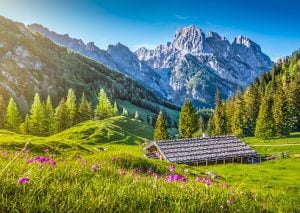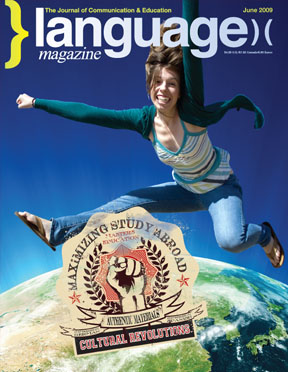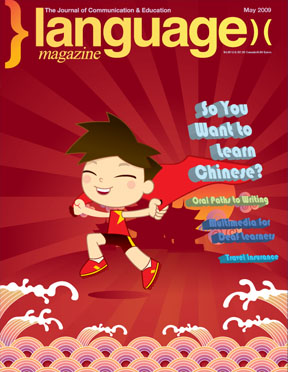With more than 330 million native speakers around the world, the ability to speak Spanish has become imperative. More than 50 million people speak Spanish as their second language, and each year this number is increasing. Not only is Spanish taught in local high schools and universities, but more students are traveling around the world to fully immerse themselves in the Spanish language and culture.
Because Spanish is so widely spoken, it is only natural that a range of dialects, pronunciations and accents have emerged in various parts of the world, leaving those who want to study Spanish wondering where they should begin. Whether it is the old world of Spain, or a Spanish-speaking country in the new world, there are quality institutions which will provide the committed learner with the opportunity to improve their language skills in just a few weeks.
Mendoza
Intercultural is a private language school and teacher education center located in Mendoza, Argentina- at Los Andes foothills- five blocks away from the bus station. Restaurants, buses, banks, supermarkets, etc. are within easy walking distance.We offer intensive Spanish courses, as well as specialized language-learning programs, as it is shown in our web site. In addition, we are able to set up internships, volunteer opportunities and accomodation for our students.
Intercultural is the first center to become an associated member of Instituto Cervantes Network, in Argentina. The school is also affiliated with Congreso University. Students have access to academic credits transferable to their universities. There are a variety of programs offered, (i) General Spanish in all levels, (ii) Academic Spanish as Preparation for Studies at Universities in Spanish speaking countries, (iii) Immersion program: Spanish lessons and homestay accommodation, (iv) Special programs: Spanish and Wine, Adventure, Latin American Studies or History, (v) Courses for ex pats, (vi) Preparation to sit for the international exam DELE, or national exam CELU, (vii) Contact organizations for volunteer and internships, (viii) Afternoon activities to improve fluency and knowledge
The main objective at Intercultural is for the students to be completely immersed in the culture and language. Students can start group courses, with a maximum of 6 students, any Monday throughout the year. Intercultural has over fifteen years of experience and is a reliable place for students and groups to learn Spanish, to volunteer, to do an internship, and to experience a life-changing-learning opportunity.
For further info visit www.spanishcourses.com.ar
Bariloche
Bariloche, recognized as the portal to Patagonia, is a wonderful place to learn Spanish. This small city surrounded by mountains and lakes is safe and you can combine your Spanish study with lots of activities in the afternoon and weekends.
Spanish School “La Montaña” offers three different courses.
The Standard course consists of 20 hours of group classes per week, lasting from 1 to 8 weeks. Classes will be Monday to Friday from 9am to 1pm, with a maximum of 4 students per class
The Intensive course is the Standard course plus 10 hours of private classes. The group classes are being held in the morning, followed by 2 hours of private classes in the afternoon to improve your own weaknesses and to sharpen your strong points.
The Private course is taught by private teachers in the afternoon The amount of hours will entirely depend upon your own goals. We can design a program completely focused on you specific needs of attention.
They encourage students to stay with host families, as a way of continue practicing Spanish. La Montaña offers various after school activities as Salsa and Tango lessons, different afternoon hikes, visiting secondary schools and one of our volunteer projects. These activities are all included in the course price, except the out-of-the pocket costs, such as a bus ticket and drinks.
Buenos Aires
Argentina’s capital, Buenos Aires, is a South American city with European flair, offering a range of cosmopolitan cuisines and a riveting nightlife. One cannot escape dancing in the birthplace of the passionate tango, where tango houses or “milongas” litter the city.
Home to more than three million people, Buenos Aires is located on the southeastern coast of the continent. Bordered by the Rio de la Plata and the Riachuelo, the city’s inhabitants are frequently called “portenos,” emphasizing the city’s role as a major port.
As for the language, Spanish learned in Argentina will be understood worldwide, however, there are a few subtle differences. According to Professor Monica del Milagro Plaza, the director of Bien Argentino, Instituto de Idioma y Cultura Argentina, “All of the varieties of Spanish are correct Spanish. Since Spanish is one of the most widely spoken languages in the world, regional particularities are to be expected. If you learn all your Spanish in one place (Argentina, Ecuador, Spain, etc.), you will understand Spanish speakers all around the world. However, the [Argentine] differences are lexical. For example, [Argentines] use voseo instead of tu and they use only one “s” sound, as in “song,” for words with s/z/c.”
COINED has schools in every strategic point in Argentina, giving the participants the chance of enjoying the different options, climates and locations this country has to offer. If you want to experience a cosmopolitan way of life then Buenos Aires or Cordoba should be a perfect choice. But if you want to enjoy cold weathers, glaciers and snowed hills then you can’t miss our schools in Ushuaia, Bariloche or Mendoza. In every school we provide the participants with comfortable facilities, audio and video room, internet and a cafeteria.
At COINED their priority is to make sure our programs meet your expectations because we they understand that your choice to pursue an experiential education entails risk and some degree of adventure. They have a wide variety of courses so that you can choose the one that suits you the best with the advantages of experience-based learning in small groups. Also they offer a minimum of two recreational activities per week so you can submerge in the local culture. You will get qualified and professional teaching. COINED offers you the possibility of obtaining credits in cooperation with various international colleges and universities. Their goal is to help you develop the skills and concepts necessary to feel comfortable in any speaking situation.
For further info, visit www.coined.com.ar
Buenos Aires Spanish School, which is located two blocks away from the National Congress, offers a variety of courses including an immersion program which consists of 20 hours of instruction per week, a semi-immersion program (10 hours a week), private classes, and Spanish language classes for children. Group courses consist of no more than six students per class and courses begin every Monday of the year. The school is a member of the Asociación Argentina de Centros ELE, an organization which ensures that students are receiving quality instruction.
For further info, visit www.baspanish.com
Academia Buenos Aires is dedicated exclusively to teaching Spanish as a foreign language, with emphasis on academic excellence, professional service, and complete immersion. Located in an exclusive, completely restored historic building in downtown Buenos Aires, on central Plaza de Mayo, the Academy caters to students from around the world in search of a high-quality academic experience. Motivated teachers with degrees in linguistics, specially-designed study materials, and years of experience, have earned the academy a cooperation agreement for university credit with the prestigious Universidad de Buenos Aires. The professional service at Academia Buenos Aires is guaranteed through multilingual staff available 24 hours a day. The complete immersion approach is based on rich study materials, the possibility to live in homestays or shared apartments with Argentines, and the extracurricular program of the Academy — at least twice a week, staff accompany students to museums, exhibitions, different barrios, concerts, tango classes, asado dinners, wine tastings, etc. All activities are free of charge. The Academy has recently opened up a second school in Montevideo, Uruguay, based on the same approach and study materials, allowing students to switch destinations seamlessly. Montevideo is a three-hour boat ride from Buenos Aires across the Rio de la Plata.
Located a few yards away from Plaza de Mayo and Puerto Madero, Alem Spanish School offers a relaxed and comfortable ambience for learning Spanish. Each class is balanced with vocabulary, pronunciation, grammar, conversation, reading, and writing exercises. Students are given numerous opportunities to practice their Spanish in a wide variety of formats. Aimed at maintaining quality programs for its students, Alem offers private lessons as well as group lessons with no more than five students.
Argentina Idioma Español, with four locations in Argentina: Buenos Aires, Patagonia, Cordoba, and Ushuaia, is the only Spanish language school in Argentina that specializes in teaching Spanish for adults and professionals. All of the school’s professional teachers hold a university degree in Spanish as a Foreign Language, which guarantees intensive and solid learning progress in a minimal amount of time. AIE offers a wide variety of immersion Spanish programs in a private or group setting as well as a Business Spanish Program, a Medical Spanish Program, internships and volunteer programs.
With locations throughout Argentina, including Buenos Aires, Argentina I.L.E.E. Spanish Schools provide the same levels of instruction at all their locations in order to provide consistent instruction for students who want to transfer to a different location.
All teachers at I.L.E.E. hold a University of Buenos Aires Master’s degree in either Literature or Education, and have taught Spanish as a foreign language for more than three years.
Bien Argentino has two locations in Argentina, one in Buenos Aires and one in Salta. While most readers may only be familiar with Buenos Aires, Salta is located in the foothills of the Andes mountains in Lerma Valley. Also known as “Salta La Linda” or “Salta the Beautiful”, tourists visit it every year for its magnificent landscapes, architectural wonders, and museums.
Because of Argentina’s rich culture, the school emphasizes the importance of culture in its programs. The school offers three main kinds of programs: Spanish language, Argentine culture, and cultural immersion. For its cultural immersion program, Bien Argentino arranges cultural immersion activities in groups of four led by experts in Argentine art and history.
DelPlata’s Casa de Idiomas, located in Recoleta, offers different private and group Spanish courses, including programs for beginners to prepare them for a trip through Argentina. The school also provides each student with intensive advice before booking a course, individual guidance during the learning process, reliable organization, and frequent teacher supervision.
ECELA Spanish Immersion Schools is the perfect opportunity to improve your Spanish while enjoying what Latin America has to offer. Combine different destinations (Buenos Aires, Bariloche, Santiago, Lima and Cusco) and learn about the local cultures. Having fun while you learn is possible al ECELA!
Instituto de Español Rayuela is located in Buenos Aires’ oldest barrio, the San Telmo, which is full of colonial houses and cobblestone streets. Founders decided to call the school “Rayuela,” which also means “Hopscotch,” as a tribute to Julio Cortázar’s famous novel, and as a reminder that teaching and learning a language should always be an enjoyable game of communication. In addition to the traditional Spanish courses, Instituto de Espanol Rayuela also offers online Spanish courses for the convenience of their students.
Mundo Español was one of the first in Argentina to offer Spanish as a Foreign Language. It is located in the touristic and historical neighborhood of San Telmo. Not only does Mundo Español provide students with Spanish instruction, but they also seek to get them involved in outside class activities. Some examples include internships and volunteer programs, sports lessons or tango lessons, which all provide a context in which the student is immersed in the Spanish language and in the Argentinean Culture,while not being in the formal classroom setting. Mundo Español offers classes at an affordable price and is the program to choose for the serious student intent on developing their skills of the Spanish language.
Mundo Español has the support of government entities and agreements with numerous international universities and national and foreign institutions. They also provide university credits. Mundo Español’s director is the former president and co-founder of the Argentine Association of Schools of Spanish as a Foreign Language (AACELE). They also offer accommodation and tourism services.
The University Language Center, part of the University of Buenos Aires, currently has more than 1,500 overseas students enrolled in its Spanish language program. Due to its affiliation with the University, the language center is also able to provide different courses, such as Business Spanish. Assistance is given to overseas students with housing and obtaining visas.
VerBaires Spanish School, which is also located in San Telmo, offers the perfect blend of antique and bohemian households, with modern lively cafés, bars and restaurants.
The school offers various courses: from a three-day survival course, to regular, semi- and intensive programs, five days a week. Courses are tailored to each student after their level of Spanish has been assessed by a placement test.
Also located in the Recoleta barrio, VOS Buenos Aires incorporates the cultural beat of Buenos Aires into its daily activities for students, such as visiting milongas to dance the tango, restaurants to taste Argentine food, and museums to learn about the different artistic styles and movements of the country. Included in the language programs, VOS Buenos Aires offers tours that are different from the typical tourist fare.
Lessons are task-based, which means students learn by doing. During class and according to each student’s level, students go shopping, order food, ask for directions, make a documentary, or invent a magazine to learn Spanish in a practical setting, in addition to formal language training. Students can choose a variety of programs, including private lessons, intensive courses, and Spanish immersion programs.
Cordoba
Espanex is the Spanish department of Academia Argüello, a well known Institution with more than 50 years of experience supporting education and learning and recognized by the Ministry of Culture and Education of Cordoba, Argentina. Espanex offers different types of intercultural programs in Argentina, among them; volunteering, internships and Spanish courses in the cities of Buenos Aires, Cordoba and recently Bariloche. The Spanish courses are from 10 to 30 hours per week and we also offer special courses which include tango, history and literature lessons for example. The internships are offered in Buenos Aires within first level and highly competitive companies. They are personalized focusing primarily on the intern’s training and learning.
Cordoba is the University city par excellence in Argentina since the UNC (National University of Cordoba) was the first one to be created, and one of the oldest in Latin America. It has around 200.000 permanent students coming from all over the country; that is why there are many things you can do every night. Today we are proud to say that all students that visit Espanex take with them great memories of Cordoba and of course, of us. This is thanks to the human quality of the people who take part in Espanex.
SET-IDIOMAS is a Spanish school located in historic Cordoba, Argentina’s second largest city. Nestled at the foot of the beautiful Sierras de Cordoba, this area is plentiful with lakes, rivers and valleys. Cordoba itself is home to an active student life. From the National University founded in 1613 to the fun and safe night life, this major city and its hospitable citizens provide a wonderful learning opportunity.
Whether students are just beginning the study of Spanish or becoming proficient, the intensive classes are an enjoyable way to learn the language. Classes meet two to four hours each day, allowing time to practice during planned excursions and free time in and around Cordoba. SET-IDIOMAS offers Spanish + tango/salsa, Spanish for academic purposes, special programs for university groups, DELE (Diploma de Español como Lengua Extranjera) preparation and Spanish on the road which combines courses in Cordoba, Buenos Aires, Mendoza and Bariloche.
Students can live with host families (includes half board) or share an apartment with Argentine students.



 The EKU English Language Program (EELI) Instruction Program (EELI) offers an intensive program of
The EKU English Language Program (EELI) Instruction Program (EELI) offers an intensive program of  What you learn here and how you learn it will not only transform your life, but the lives of everyone around you. Serving more than 15,000 students in approximately 40 countries, Nova Southeastern University’s Fischler School of Education and Human Services is one of the largest schools of education at an accredited university in the United States.
What you learn here and how you learn it will not only transform your life, but the lives of everyone around you. Serving more than 15,000 students in approximately 40 countries, Nova Southeastern University’s Fischler School of Education and Human Services is one of the largest schools of education at an accredited university in the United States. Nova Southeastern University (NSU), an independent, nonprofit university chartered by the state of Florida in 1964, is the sixth largest independent university in the United States. It is located on a 300-acre main campus west of Fort Lauderdale, with three other campuses in the South Florida area. NSU is licensed to operate in 30 of the 50 states and is alma mater to about 90,000 graduates.The university, with more than 26,000 students, is an acknowledged leader in field-based and other distance education degree programs, offering associate’s, bachelor’s, master’s, educational specialist, and doctoral degrees across the nation and at selected international sites. NSU offers degrees in education, law, oceanography, computer sciences, business and public administration, psychology, the health professions, the liberal arts, and others.
Nova Southeastern University (NSU), an independent, nonprofit university chartered by the state of Florida in 1964, is the sixth largest independent university in the United States. It is located on a 300-acre main campus west of Fort Lauderdale, with three other campuses in the South Florida area. NSU is licensed to operate in 30 of the 50 states and is alma mater to about 90,000 graduates.The university, with more than 26,000 students, is an acknowledged leader in field-based and other distance education degree programs, offering associate’s, bachelor’s, master’s, educational specialist, and doctoral degrees across the nation and at selected international sites. NSU offers degrees in education, law, oceanography, computer sciences, business and public administration, psychology, the health professions, the liberal arts, and others. Visit the Alps
Visit the Alps


